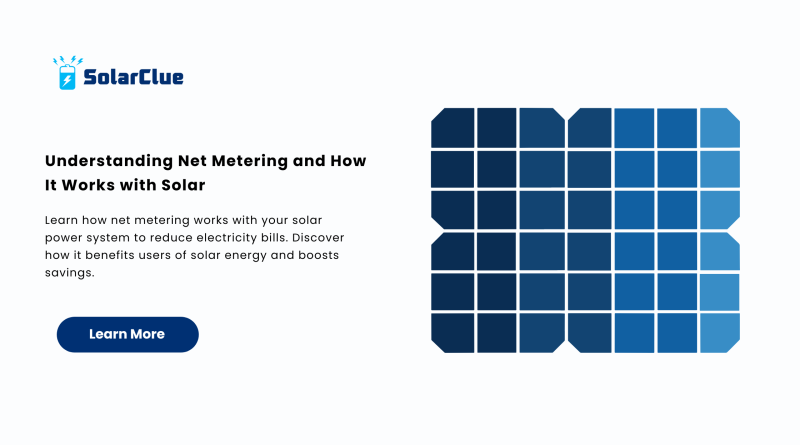Understanding Net Metering and How It Works with Solar
As more homeowners and businesses embrace solar energy, the concept of net metering has become increasingly important. Net metering is a billing arrangement that allows solar panel owners to receive credit for excess electricity they send back to the grid. This not only enhances the economic benefits of using solar power systems but also contributes to a more sustainable and efficient energy infrastructure.
In this blog, we’ll break down how net metering works, why it’s important, and how it can benefit anyone investing in a solar panel system. Whether you’re considering switching to solar or already producing your own power, understanding net metering can help you maximize your returns.
Table of Contents
What Is Net Metering?
Net metering is a utility billing mechanism that allows solar energy users to feed surplus electricity generated by their solar panels back into the grid. When your solar power system produces more electricity than you use during the day, that extra energy is exported to the grid. In return, your electricity provider gives you credits that you can use when your system is not generating enough power, such as at night or on cloudy days.
This way, you only pay for your “net” electricity usage—the difference between what you consume from the grid and what you produce. It turns your solar power system into both a source of clean energy and a smart financial investment.

How Does Net Metering Work?
The process is straightforward yet highly efficient:
1. Solar Panel Generation:
Your solar panel system converts sunlight into electricity, which powers your home or business.
2. Energy Usage and Surplus:
If your solar system produces more electricity than you need, the excess is automatically sent back to the utility grid.
3. Meter Reversal:
Your electricity meter runs backward when you’re sending energy back to the grid, effectively reducing your electricity bill.
4. Credit Accumulation:
You earn energy credits for the excess power, which can be used later when your solar generation is lower than your consumption.
5. Monthly Billing:
At the end of the billing cycle, your utility company calculates your net usage. If you’ve exported more than you’ve consumed, your bill may even be ₹0 or negative.
Benefits of Net Metering
Reduced Electricity Bills
Net metering directly offsets the cost of power drawn from the grid, making your solar energy investment more profitable.
Faster ROI on Solar Power Systems
By lowering monthly bills and sometimes eliminating them, net metering helps you recover your investment in a solar panel system faster.
Efficient Use of Solar Energy
It ensures no solar energy goes to waste. Even if you’re not home to use it, your system contributes to the grid and earns you credit.
Environmental Impact
By exporting clean energy to the grid, you reduce dependency on fossil fuels, promoting a greener environment.
Energy Independence
Combined with battery storage, net metering moves you closer to energy independence by reducing reliance on the utility.
Net Metering in India: What You Should Know
The Indian government has been actively promoting solar energy adoption through supportive net metering policies. The exact structure varies by state, but in general, utilities allow residential and commercial users to connect solar power systems up to a certain capacity and enjoy net metering benefits.
Here are some highlights:
-
Eligibility: Residential, commercial, and industrial consumers with rooftop solar installations.
-
System Size Limits: Vary by state (usually 1 kW to 1 MW).
-
Tariff Rates: The credit rate per unit is typically equivalent to the retail electricity rate.
-
Billing Cycle: Usually monthly or bi-monthly with net adjustments.
Key Components Required for Net Metering
1. Bi-directional Meter:
Essential for measuring both the electricity imported from and exported to the grid.
2. Grid-Tied Inverter:
Converts DC from your solar panel into AC and synchronizes with the grid supply.
3. Solar Power System:
A well-sized system tailored to your consumption needs is crucial for optimizing net metering benefits.
4. Utility Approval:
You must get approval and an agreement from your local utility to avail net metering benefits.
Common Misconceptions About Net Metering
“I’ll earn money monthly.”
Net metering reduces your bill but doesn’t always mean you’ll receive money. You earn credits, not cash.
“I don’t need batteries.”
True to an extent. However, batteries provide backup during outages, which net metering doesn’t.
“I won’t need the grid anymore.”
Net metering keeps you connected to the grid—you still rely on it when your solar energy production is low.
Tips to Maximize Net Metering Benefits
-
Install the right system size: Oversized systems may not yield extra value; check your usage and net metering limits.
-
Optimize panel direction and tilt: Ensure your solar panel installation captures maximum sunlight.
-
Monitor usage and generation: Use apps or smart meters to track and adjust your consumption habits.
-
Regular maintenance: Keep your panels clean and in top condition for best performance.
The Future of Net Metering in India
With India targeting ambitious renewable energy goals, net metering will play a significant role in democratizing energy access. As states streamline policies and DISCOMs embrace solar integration, more consumers will benefit from seamless energy credits and increased savings.
However, policy changes may influence tariff rates and credit structures. So staying updated on your state’s guidelines and DISCOM policies is essential.
FAQs
1. Can I earn money through net metering?
You don’t earn direct cash; instead, you receive energy credits to offset your electricity bill.
2. What happens if I generate more energy than I use?
You receive credits for the surplus energy, which can be used in future billing cycles.
3. Is net metering available everywhere in India?
Most states support net metering, but eligibility and policies vary. Check with your state DISCOM for exact rules.
4. Do I need a battery for net metering?
No, batteries are not required for net metering, but they help during power outages.
5. How long does it take to recover the investment in a solar power system with net metering?
Typically, 4–6 years depending on system size, location, and electricity usage.
If you’re ready to take advantage of net metering for solar power system savings and reduce your dependency on traditional power sources, explore our solar solutions today at solarclue.com. For more insights and updates on solar technology, visit our dedicated blog at blog.solarclue.com. Let the sun power your savings in the smartest way possible.



